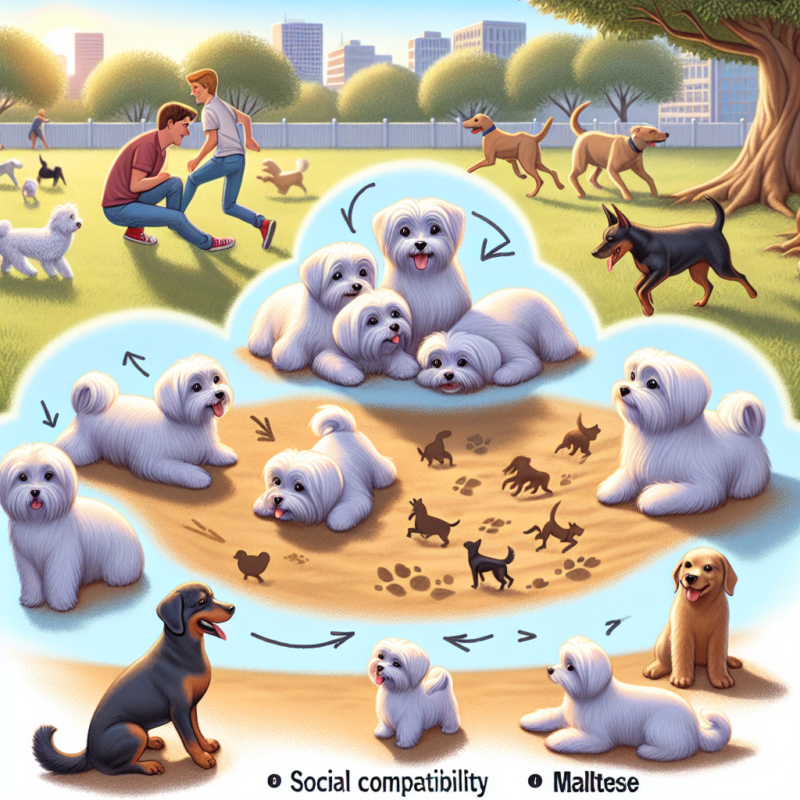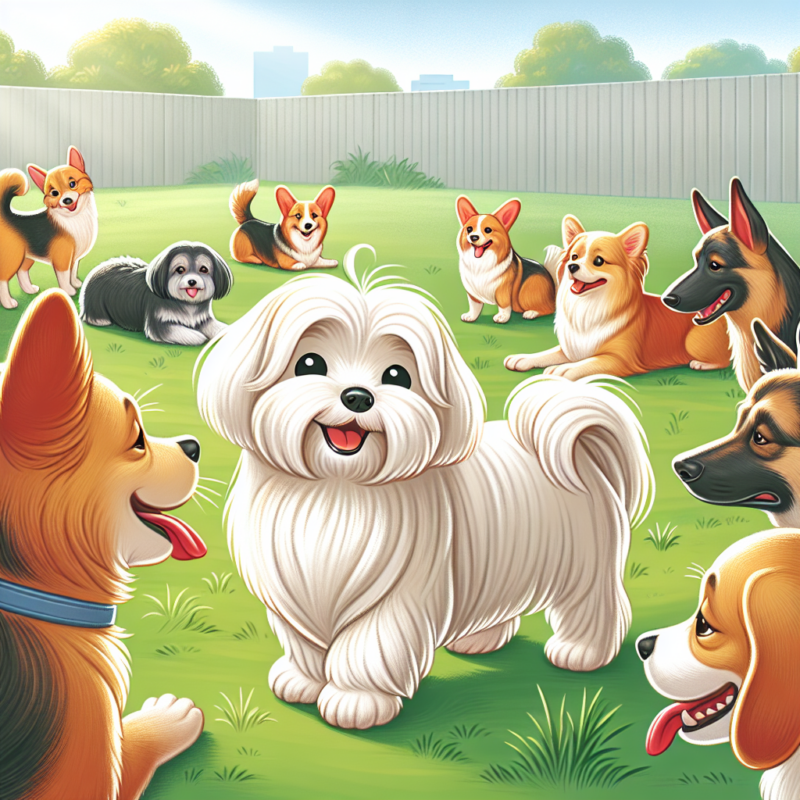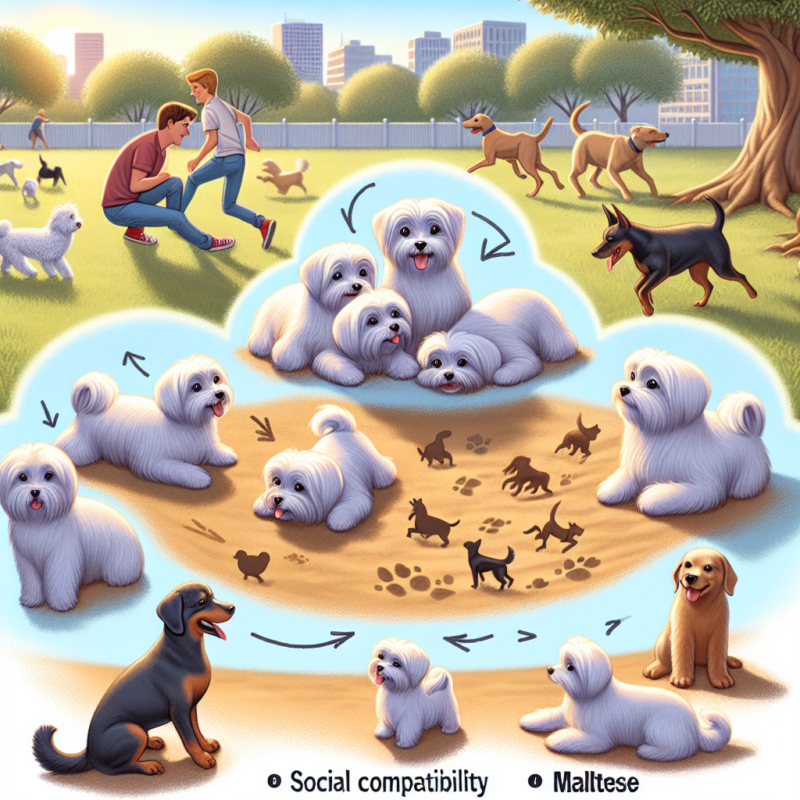If you’re considering getting a Maltese as a new furry addition to your home, you might be wondering if they are good with other dogs. Well, let me put your mind at ease – Maltese dogs are known for their friendly and sociable nature, making them generally great companions for other dogs. Whether you already have a pooch at home or are planning on getting another one in the future, the adaptable and amiable Maltese is likely to get along just fine with their four-legged friends.
Are Maltese Good With Other Dogs?
If you’re considering adding a Maltese to your family and already have other dogs, you may be wondering if Maltese dogs are good with other canines. Well, you’re in luck! Maltese dogs, known for their charming personalities and loving nature, generally get along well with other dogs if certain factors are taken into consideration. In this article, we’ll provide you with a comprehensive overview of the Maltese dog breed, discuss their temperament, and explore the various factors that can affect their interaction with other dogs. So, let’s dive in and find out if Maltese dogs are a good fit for your canine family!
Overview of Maltese Dog Breed
Origin and History
The Maltese dog breed is a small and ancient breed that originated from the Mediterranean island of Malta. These adorable little dogs have a rich history that dates back thousands of years, with evidence of their existence found in ancient Greek and Roman art. Over the centuries, Maltese dogs have been cherished as companion animals, known for their loyalty, affection, and elegance.
Appearance and Size
Maltese dogs are small in size and are instantly recognizable by their beautiful, silky white coat. They have a compact body with a graceful stance and expressive dark eyes. Despite their small size, Maltese dogs are sturdy and well-proportioned, making them agile and capable of agile movements. Typically, adult Maltese dogs weigh between 4 to 7 pounds and stand about 8 to 10 inches tall at the shoulder.
Health and Lifespan
Maltese dogs are generally healthy, with a lifespan of around 12 to 15 years. However, as with any breed, they may be prone to certain health conditions. Some common health issues that can affect Maltese dogs include dental problems, eye conditions, allergies, and patellar luxation. Regular veterinary check-ups, proper dental care, and a nutritious diet can help ensure their overall well-being and longevity.

Temperament of Maltese Dogs
Friendly and Playful Nature
One of the defining traits of Maltese dogs is their friendly and playful nature. These little furballs are social butterflies who thrive on human companionship and enjoy being the center of attention. They possess a curious and inquisitive nature, always ready for a game or playtime with their favorite humans or fellow furry friends.
Adaptability to Different Environments
Maltese dogs are highly adaptable and can thrive in various living situations, including apartment living. Their small size makes them suitable for urban dwellings, and they can easily adjust to different environments, whether it’s a bustling city or a quiet countryside. However, it’s important to provide them with enough mental and physical stimulation to prevent boredom and ensure their overall happiness.
Affectionate and Loving Towards Their Owners
Maltese dogs are known for their deep affection and loyalty towards their owners. They form strong bonds with their human family members and are always eager to offer love and companionship. Their gentle and loving nature makes them wonderful lap dogs and perfect partners for snuggling on the couch. They are great with children, making them a suitable choice for families with kids.
Factors Affecting Maltese’s Interaction With Other Dogs
Early Socialization
Early socialization plays a crucial role in shaping a Maltese dog’s behavior and their ability to interact positively with other dogs. It’s important to expose your Maltese puppy to different dogs of various sizes, breeds, and temperaments from a young age. By gradually introducing them to different experiences, such as puppy playdates or obedience classes, you can help them develop good social skills and build confidence when interacting with other dogs throughout their lives.
Individual Dog’s Personality
Just like humans, each Maltese dog has their own unique personality. Some may be more outgoing and eager to socialize, while others may be more reserved or shy. Genetic factors can influence a dog’s temperament, but their upbringing and previous experiences also play a significant role. Understanding and respecting your Maltese dog’s individual personality will help you navigate their interactions with other dogs and ensure their comfort and well-being.
Size and Energy Level of Other Dogs
Maltese dogs are small in size but are known for their spirited and playful nature. When it comes to interacting with other dogs, size and energy levels can play a role in determining compatibility. While Maltese dogs generally get along well with other small breeds, interactions with medium to large dogs should be closely monitored to ensure the safety of both parties. It’s important to match energy levels for play and consider the potential for accidental injuries due to size differences.
Handling and Training Techniques
The way a dog is handled and trained can greatly influence their behavior towards other dogs. Positive reinforcement methods, such as rewards and praise, are highly effective in teaching Maltese dogs to associate positive experiences with interacting with other canines. It’s important to avoid harsh punishments or negative reinforcement techniques, as they can lead to fear or aggression in your Maltese. Consistency, patience, and gentle guidance are key to fostering positive interactions between your Maltese and other dogs.
Introducing Dogs Properly
Properly introducing your Maltese to other dogs is essential to ensure a smooth and positive interaction. Start by choosing a neutral territory, away from your Maltese’s usual living space, to prevent territorial behaviors. Use controlled and supervised introductions, keeping both dogs on a leash, and closely observe their body language and behavior. Gradually increase the interaction time, giving them breaks and providing positive reinforcement for calm and friendly behavior. Remember, each dog has their own pace, so be patient throughout the process.

Early Socialization
Importance of Socializing Maltese Puppies
Early socialization is crucial for Maltese puppies to grow into well-rounded and confident adult dogs. Exposing them to various experiences, including meeting other dogs, helps them develop positive associations and reduces the likelihood of fear or aggression towards other canines. Socializing your Maltese puppy during their critical developmental period, which is typically between 3 to 14 weeks of age, sets the foundation for lifelong social skills.
Positive Experiences with Other Dogs
When socializing your Maltese puppy with other dogs, it’s important to ensure that the experiences are positive and enjoyable. Avoid overwhelming them by introducing them to dogs of similar size and gentle temperament. Arrange playdates with well-socialized dogs in a controlled environment where they can interact and learn from each other in a safe and supervised manner. Celebrate their successful interactions with praise and rewards, further reinforcing positive associations.
Exposure to Different Environments and Situations
In addition to interacting with other dogs, exposing your Maltese puppy to different environments and situations is equally important. Take them for walks in parks, introduce them to different sounds and smells, and expose them to various stimuli. This will help them become adaptable and confident in unfamiliar situations, reducing the likelihood of anxiety or fear responses when encountering new dogs or environments in the future.
Individual Dog’s Personality
Instincts and Genetic Factors
Every dog, including Maltese, has a unique set of instincts and genetic factors that contribute to their personality. Some Maltese dogs may have a stronger prey drive or be more territorial, while others may be naturally more social or submissive. Understanding your Maltese dog’s instincts and genetic tendencies can help you tailor their interactions with other dogs accordingly and ensure their comfort and well-being.
Previous Experiences and Traumas
Just like humans, dogs can be affected by past experiences and traumas, which can shape their behavior towards other dogs. If your Maltese has had negative experiences in the past, such as bullying or aggression from other dogs, they may exhibit fear or defensive behavior when encountering unfamiliar canines. It’s important to provide a safe and supportive environment for your Maltese, gradually rebuilding their confidence and trust in other dogs through positive interactions.
Fear vs. Confidence Levels
Fear and confidence levels vary among individual dogs, including Maltese. Some Maltese dogs may naturally be more timid or fearful, while others may exhibit a higher level of confidence. When introducing your Maltese to other dogs, it’s essential to pay attention to their body language and emotional state. If your Maltese shows signs of fear or discomfort, it’s important to respect their boundaries and gradually increase their exposure to other dogs at their own pace.
Size and Energy Level of Other Dogs
Maltese vs. Other Small Breeds
Maltese dogs generally get along well with other small dog breeds. Their similar size and energy levels make for compatible playmates. However, it’s important to remember that individual dog personalities and temperaments can still vary. Proper socialization and supervised interactions are key to establishing positive relationships between your Maltese and other small breed dogs.
Interaction with Medium to Large Dogs
When it comes to interacting with medium to large dogs, caution and supervision are necessary. The size difference between a Maltese and larger dogs can create potential risks, such as accidental injuries. It’s important to monitor their interactions closely and intervene if necessary. Gradual introductions and ensuring the larger dog is well-behaved and gentle can help facilitate a harmonious relationship between your Maltese and bigger canines.
Matching Energy Levels for Play
Matching energy levels is crucial when allowing your Maltese to interact with other dogs. While Maltese dogs are known for their playful nature, they may become overwhelmed or intimidated by dogs with excessively high energy levels. Ensuring that the play styles and energy levels of both dogs are compatible will help prevent any potential conflicts or stress during their interactions.
Handling and Training Techniques
Positive Reinforcement Methods
Opting for positive reinforcement methods when handling and training your Maltese is highly effective and encourages positive interactions with other dogs. Rewarding your Maltese with praise, treats, or playtime when they display calm and friendly behavior towards other dogs creates positive associations. Conversely, avoiding harsh punishments or negative reinforcement techniques helps prevent fear or aggression towards other canines.
Proper Leash Training
Leash training is essential for ensuring controlled and well-behaved interactions between your Maltese and other dogs. Teaching your Maltese to walk politely on a leash and respond to your commands helps prevent pulling or lunging, which can cause tension or aggression during encounters with other dogs. A properly leash-trained Maltese is easier to handle and allows for smooth introductions and interactions with fellow canines.
Impacts of Harsh Punishments on Behavior
Using harsh punishments or negative reinforcement techniques when handling or training your Maltese can have detrimental effects on their behavior towards other dogs. Harsh punishments can create fear, anxiety, or aggression, causing your Maltese to develop unfavorable associations with other dogs. It’s important to opt for positive and gentle training methods, promoting confidence and a positive attitude during interactions with other canines.
Introducing Dogs Properly
Neutral Territory
When introducing your Maltese to a new dog, it’s best to choose a neutral territory away from your Maltese’s usual living space. This helps prevent territorial behaviors and allows both dogs to feel more at ease. A neutral environment reduces the chances of conflict and creates a more balanced and neutral starting point for their interaction.
Supervised Controlled Introduction
The initial introduction between your Maltese and the other dog should be well-supervised and controlled. Have both dogs on leashes and allow them to approach each other gradually, monitoring their body language and behavior. It’s important to stay calm and relaxed during this process, as your energy can affect the dogs’ reactions. Look for signs of calmness, curiosity, and positive body language from both dogs, and be ready to intervene if any signs of tension or aggression occur.
Gradual Increase in Interaction Time
Once the initial introduction between your Maltese and the other dog goes well, you can gradually increase the interaction time. Allow them to spend short periods together, always watching for signs of comfort and enjoyment. It’s important to take breaks, separate them if necessary, and provide positive reinforcement for calm and friendly behavior. Slowly build up the time they spend together, ensuring their safety, comfort, and positive experiences throughout the process.
Tips for Successful Dog Interactions with a Maltese
Start with Positive Reinforcement Training
Before introducing your Maltese to other dogs, invest time in positive reinforcement training. Teach them basic commands, proper leash manners, and reward them for positive behavior. By building a solid foundation of training and obedience, your Maltese will be more likely to respond well during interactions with other dogs.
Consulting an Experienced Dog Trainer
If you’re unsure about how to introduce your Maltese to other dogs or have concerns about their behavior, consulting an experienced dog trainer can be highly beneficial. A professional trainer can offer guidance, provide training techniques, and tailor their advice to specifically meet the needs of your Maltese. They can also evaluate your Maltese’s temperament and recommend strategies to ensure successful interactions with other dogs.
Ensuring a Safe and Controlled Environment
Creating a safe and controlled environment is key to successful interactions between your Maltese and other dogs. Supervise all interactions closely, provide a secure and comfortable space for them to meet, and have necessary tools like leashes or barriers on hand. By setting up the environment for success, you can ensure the safety and well-being of both dogs during their interactions.
In conclusion, Maltese dogs can be good companions and get along well with other dogs if certain factors are considered. Early socialization, respecting individual dog’s personalities, matching energy levels, positive handling and training techniques, and proper introductions are all important for fostering positive relationships between your Maltese and other canines. By taking the time to understand their needs, provide proper socialization, and promote positive experiences, you can ensure harmonious interactions and a happy and well-adjusted Maltese in your multi-dog household.
